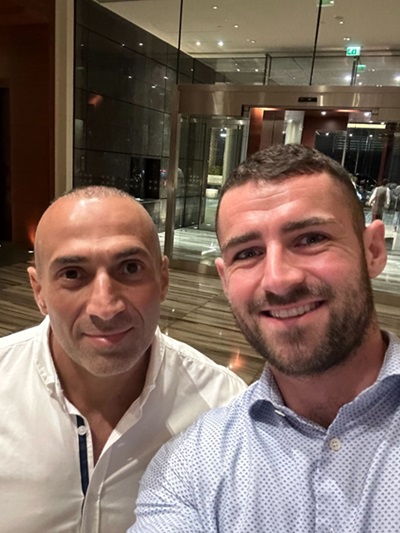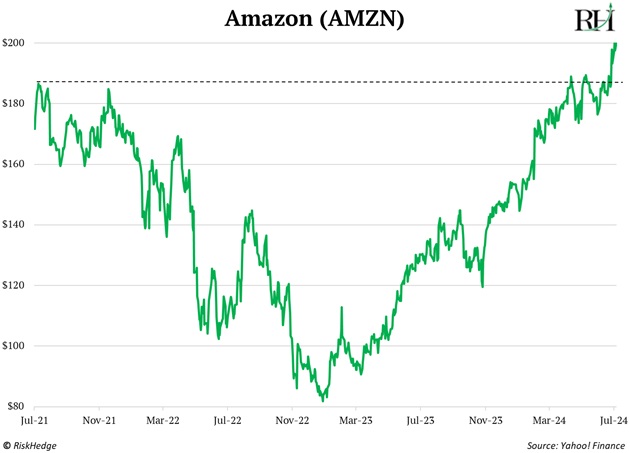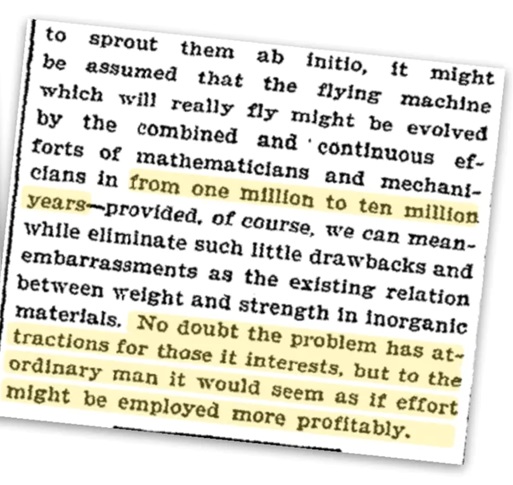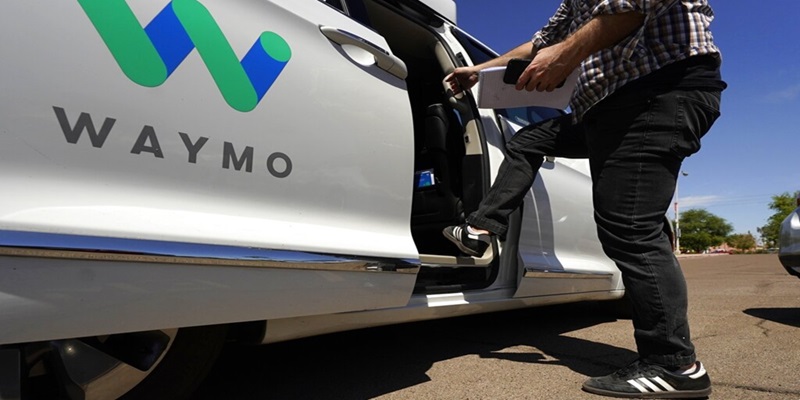My wife and I had an awesome July 4th weekend in Abu Dhabi.
A special thank you to Tariq, a RiskHedge member who I met while in town. Tariq was kind enough to gift us three boxes of dates, a local delicacy.

Fifty years ago, Abu Dhabi was a barren desert with no running water and mud-brick houses. Now, it looks like the new Manhattan.
I’ll be back soon.
Let’s get after it…
- The S&P 500 hits another new all-time high…
Notching its 33rd fresh high of the year.
A handful of names like Nvidia (NVDA) and Microsoft (MSFT) have carried the market higher over the past few months. Just 1% of stocks accounted for 60% of the gains.
Investors thought once the big dogs faltered, the market would collapse.
Well… NVDA dipped 10% and yet the market continues to make new highs.
We’re seeing what the pros call “rotation.” It’s a sign of a healthy market when the former laggards catch up to the leaders.
Take Amazon (AMZN). Its stock went nowhere for three years, and now it’s breaking out:

And Tesla (TSLA) has surged 20% since we talked about it two weeks ago.
We’ll see a correction at some point. Remember, US stocks dip 14% in an average year. But the fact many big, important stocks are breaking out tells me there’s real strength in this market.
There’s plenty of money to be made right now. If you’re looking to profit the RiskHedge way, we’re now accepting 100 new members into our All-Access program. Go here for details.
- Last week: Cancer vaccines. This week…
An artificial intelligence (AI) blood test that can predict Parkinson’s seven years before symptoms arise.
Researchers in London used an AI algorithm—like the one powering ChatGPT—to spot patterns of “bad” proteins in Parkinson’s patients.
The algorithm was then able to predict future Parkinson’s in other folks from a simple blood sample… seven years before it hit.
My aunt recently had a stroke that left her in a wheelchair. She’s only 50, was active, and seemed healthy. Unfortunately, there was a huge buildup of “bad proteins” in her brain, putting her at high risk of a stroke.
Yet nobody had any idea what was coming because she had no symptoms.
What if AI could forecast disease like the app on your iPhone forecasts the weather? We could catch life-changing illnesses before it’s too late.
In the simplest terms, AI is an ultra-fast computer. It “ingests” mind-bending amounts of medical data, then offers new ideas that would take us humans a lifetime to discover.
|
The AI “doctor on your phone” could analyze all your health records: bloods… eye scans … sleep history… physical activity… cholesterol… and predict your odds of illness.
This future is closer than you think. Throw AI-designed drugs into the mix, and the possibilities get truly wild.
AI remains underhyped. It will help save millions of lives.
Most people are focused on chatbots like ChatGPT and Claude, and rightly so. They’re amazing tools, and you should use them.
But AI transforming healthcare is where the rubber meets the road. This is a trillion-dollar opportunity, and ours for the taking.
It’ll take time… but every hospital will have its own cluster of AI chips and mini data centers. Inside, the AI’s “doctors” will be hard at work, sleuthing out disease and saving lives.
- The first thing I’ll do when I land in San Francisco in October is…
Hail a robotaxi.
Google (GOOG)-owned Waymo just opened its robotaxi service to everyone in San Francisco.
Waymo works like Uber (UBER). You download an app and request a ride. Except when the car pulls up, there’s nobody behind the steering wheel.
Self-driving cars have had many false starts over the past decade. They’re always “just around the corner,” yet never arrive.
But now Waymo is taking the training wheels off, and I’m hearing Tesla’s new “full self-driving” mode is a huge leap forward. Robotaxis are set to have their “iPhone moment.”
What changed? Waymo and Tesla used to rely on human code. Now, they’re powered by AI that learns from itself. It’s like going from using a screwdriver to a power drill. Game-changer.
RiskHedge readers didn’t like it when I said driving would one day be illegal.
I’m not in favor of a government ban. But self-driving cars will become so safe and so convenient, only hobbyists will want to take control of the wheel.
And the robotaxi takeover can happen much faster than you think.
A century ago, the streets of Manhattan were packed with horses and carriages. Ten years later, all you could see were cars.
And tech adoption is speeding up.
It took landline phones 55 years to reach a critical mass in America. Smartphones did it in just 12 years.
Mark my words: Robotaxis will be in every major American city within five years.
Invest accordingly.
- Today’s dose of optimism…
In 1903, The New York Times predicted it’d take at least 1 million years to build the airplane.
The Wright Brothers achieved manned flight just nine weeks later.

Source: @pronounced_kyle on X
Lesson: Never underestimate the power of innovation. Entrepreneurs constantly find new ways of making things better… faster… cheaper.
The Wright Brothers started with simple kites, then gliders, and finally built the first “flying machine.”
Long innovation. Short corporate media.
I’ll see you Wednesday.
Stephen McBride
Chief Analyst, RiskHedge
PS: As I mentioned earlier, we’re now accepting new members to our All-Access program. In short, this special level of membership gives you All-Access to every service we offer for the next 18 months for a favorable, one-time flat fee. (Roughly a $9,740 savings compared to what people would need to pay if they bought our services individually.)



